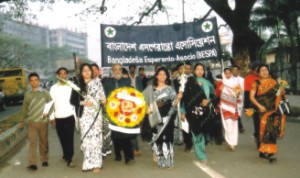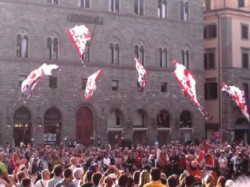|
Perspective
Nothing is more International than Esperanto
Muhammad Mahbubul Huq
 |
Prabhat Feri by Dhaka Esperanto Group |
There have been several efforts from time to time at different places by many people to devise a single language for the entire mankind. It is easy to guess the benefits if such an effort succeeded. Many such 'constructed' (some people wrongly say 'artificial') languages exist today. The most widely spoken constructed language is Esperanto. It was introduced by Dr Ludovic Lazarus Zamenhof in 1887. It was not meant for any particular ethnic group or any country. It was created not to replace anybody's mother tongue but to be used as a medium of communication between different nations. He hoped to unite the peoples of the world with an international second language ie second to the mother tongue of the people concerned. Similar attempts were made by others before him, and many other constructed languages were introduced later. Esperanto, the most vibrant constructed language, has more than two million speakers all over the world. There are even at least a thousand 'native speakers'. By native speakers I mean children whose parents (usually from different linguistic backgrounds) decided to teach Esperanto as the first language to their children and speak the language at home. There is evidence that learning Esperanto provides a good foundation for learning languages in general.
 |
| A traditional display of flag tossing in the Piazza della Signoria in Florence |
There are Esperanto groups or clubs in almost all major cities of the world, and more than a hundred periodicals are published regularly in this language. Esperanto is the official medium of instruction in at least one university ie Akademio Internacia de la Sciencoj in San Marino. It is a flexible language and very easy to learn because it follows a logical pattern. Esperanto speakers convene Universal Congresses every year attended by 1500 to 3000 participants, and regional ones also take place in different regions from time to time. Some Asian countries like China, India, Japan, Korea, Nepal and some others have national conventions almost every year. Esperantists all over the world are involved in a peaceful movement for human rights especially the right to preserve and promote one's mother tongue and establish equal status for the mother tongues of all linguistic groups. The objectives of the movement are enshrined in their manifesto known as the Prague Manifesto. These are democracy, global education, effective education, multilingualism, language rights, language diversity and human emancipation. Esperantists make a very special use of the language in international travel. Every year they publish a list of Esperantists in a book called Pasporta Servo (Passport Service). Many Esperantists voluntarily enlist their names and addresses for the information of foreigners travelling to or through their countries and offer their voluntary services to them. They allow foreigners to stay in their houses without charging any money and some also provide free meals. Paspota Servo of 2006 lists 1320 such addresses in 92 countries. To avail such services one must speak in Esperanto.
It is surprising that hardly anybody in Bangladesh knows much about Esperanto. Being a champion of language rights and a protagonist of equal status for all languages, Bangladesh should have been in the forefront of Esperanto Movement. It is, however, heartening to note that the current President of Universala Esperanto-Asocio or Universal Esperanto Association (UEA) is a Bengalee from India. He is the second Asian to hold that post in the organisation's history of a hundred years. With the publication of this article it is hoped that some University or other organization will sponsor an Esperanto Movement in Bangladesh. In April-May 2008 the Daffodil International University allowed a few enthusiasts including the Head of its English Department to use one of its classrooms for learning Esperanto.
Here are the comments of some famous people on Esperanto.
Rabinranath Tagore in 1926: A powerful invention by an extraordinary brain.
Mahathma Gandhi in 1931: I am for a uniform calendar for the whole world, as I am for equal value of every country and for a world language like Esperanto for every people of the world.
Alfred Einstein: Esperanto is the best solution of an international language.
Leo Tolstoy in 1894: I could after not more than two hours' study, if not write, at least read freely in the language.
Forty members of the French Academy of Sciences in 1924: A masterpiece of logic and simplicity.
Fidel Castro: I consider myself a soldier of Esperanto. It is not important that you have small numbers, your idea will succeed. It will succeed because it is just. Each nation has its language, humanity should have its own, Esperanto.
Long ago much before the days of search engines like Google when I was a young officer of the Air Force, I heard a little bit about Esperanto in a radio programme of BBC. I had no idea about constructed languages at that time. I wanted to know more about Esperanto but none of my friends and acquaintances could give me any information. They were as ignorant as I. After all, they were my friends and had to be birds of a feather. I consulted the Encyclopaedia Britanica and found the address of the UEA in the Netherlands. Later I followed a 12-lesson correspondence course conducted by the British Esperanto Association. None of my acquaintances showed interest in Esperanto because they thought that the time spent for Esperanto would yield better dividends if it were spent for learning English instead. Since members of the disciplined forces are discouraged to fraternize with foreigners and none of my friends in the country was interested in the subject, I couldn't improve my Esperanto and forgot all about it.
In the beginning of 2007 I had the opportunity of visiting Denmark for three weeks. It was eight years after my retirement from the Air Force, and therefore I was not restricted by any rule to fraternize with foreigners. Before leaving for Denmark, I searched our entire house and managed to find some old papers containing Esperanto lessons. I also availed of the services of Google to brush up my Esperanto. As I had learnt the language through a correspondence course, I was not absolutely sure about the sound or pronunciation of the language. When in Copenhagen I discovered that the members of an Esperanto Club meet every Monday evening. I was invited to join their meeting. In a large hall they were divided into small groups according to age, interests and also some according to their level of proficiency in the language. The President of the club and some others were teaching the language to new Esperantists. The other groups were engaged in babilado (Adda in Bangla) in Esperanto of course and not Danish. Most of them had not seen a Bangladeshi before let alone a Bangladeshi who speaks Esperanto. They were curious to hear from me about myself and about Bangladesh. I could hardly understand them as I had not 'heard' the language before. However, I managed to say something though I must confess not with the correct pronunciation. During the weekend two Danish Esperantists volunteered to be my guide and showed me some interesting places. Encouraged by their hospitality I decided to visit Norway. I contacted the club in Oslo by telephone and the Secretary of the club told me that he would receive me at the bus station and be my guide as I wanted to see some important places of Oslo. I said, “I am stranger from South Asia. My first name is Muhammad. I sport a beard and I always carry a bag. Are you sure that you still agree to receive me and that too in a Bus Station?” He replied, “I understand what you mean. I will receive you because you speak Esperanto.” He was very useful during my short visit to Oslo.
In February 2008 the Fifth Asian Esperanto Congress was held in Bangalore. I was the sole participant from Bangladesh among 160 delegates from 29 countries from Asia and elsewhere. All the participants communicated with one another without the help of any interpreter. That created a truly international atmosphere. During my address to the Congress I said a few words about our struggle for language rights, and that Bangladeshis had come up with the idea of International Mother Language Day. During the tea break some Europeans including a journalist told me that though they had been observing the International Mother Language Day they had no idea about the background of the Day and wanted me to write an article on the subject. I thought it was a good opportunity to write about something of which Bangladeshis are justifiably proud and also to project a positive picture of Bangladesh abroad when most things that foreigners hear about us are dismal and not infrequently absolutely shameful. After the Congress I wrote the article in Esperanto and sent it by e-mail. Its title is 'La Fono de Internacia Tago de Gepatra Lingvo' or 'The Background of International Mother Language Day'. It was published in a Paris based bilingual (Esperanto & French) magazine 'Le monde de l'Esperanto'.
The sixth Asian Esperanto Congress is scheduled to be held in Mongolia in 2010 and the next ie 94th Universal Congress will take place in Poland. While reporting about the Fifth Asian Congress the outgoing President (Mr Hori Yasu from Japan) of KAEM (Commission of the UEA for Asian Esperanto Movement) mentioned something I had said while addressing the Congress in Bangalore. In fact, the title of one of his reports was a quote from my address to the Congress: “Nenio estas pli internacia ol Esperanto” or 'Nothing is more international than Esperanto.'
The writer can be contacted at [email protected]
Copyright
(R) thedailystar.net 2009 |
